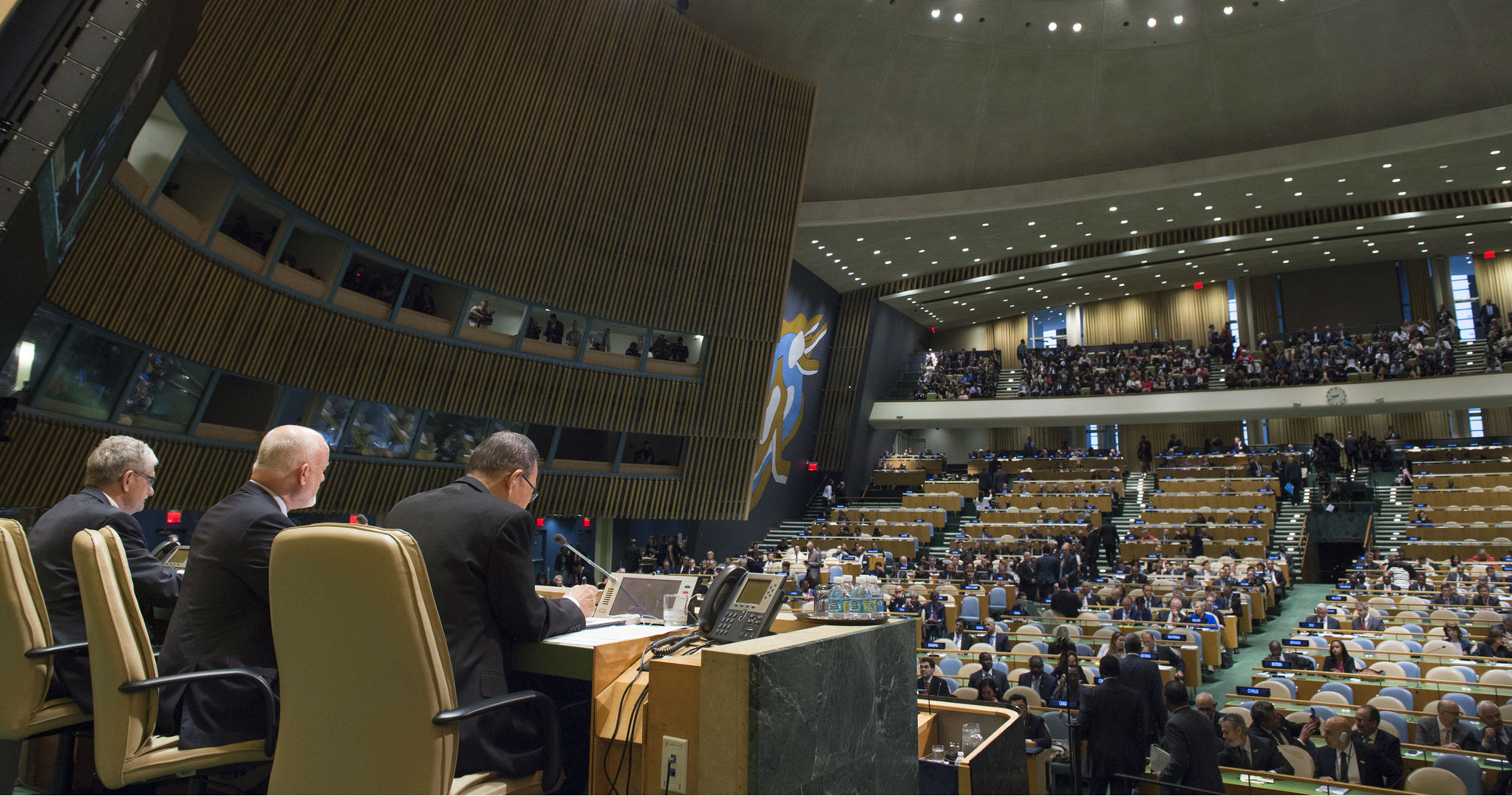
Summit for Refugees and Migrants at the 2016 U.N. General Assembly. UN Photo/Eskinder Debebe / AFSC
This month, heads of state and government from throughout the world will descend on the United Nations for the opening of the 72nd session of the U.N. General Assembly. This year’s theme is “Focusing on People: Striving for Peace and a Decent Life for All on a Sustainable Planet.” And it’s certainly critical now given the range of global challenges we face, including an unprecedented level of humanitarian need, rising inequality and exclusion, growing climate change impacts, and increasing threats to our shared security.
Global peacebuilding organizations—including the Quaker U.N. Office, sister organization to AFSC—have used this opportunity to call for governments to truly show their recommitment to peace. Many eyes will be on the United States, where a new administration’s approach to domestic and global affairs has brought tremendous changes at home and abroad, including when it comes to how the government engages with the U.N.
While not a perfect institution, the United Nations is the global body that provides a forum for all countries to lend their voices on human rights, peace and security, and development. It is leading work that impacts the daily lives of countless people across the globe, and it sets norms that guide policy and practice in all countries.
Despite the impact of the U.N., and the vital contributions made by the United States, there are growing concerns that the U.S. will reduce support and funding of the U.N. Amid broader proposals for deep cuts in U.S. support for human needs and other non-military spending domestically and internationally, a range of proposals have advanced from Congress and the White House to severely cut the U.N. budget.
We’ve even seen the first threats become a reality when, in March of this year, the U.S. stopped funding to the U.N. Population Fund, which delivers vital support for women and girls, and in June when the government declared it would take steps to leave the Paris Climate Change Agreement.
So, what are the key things to be aware of when it comes to the United States and its relationship with and support of the U.N.? And how can you show your support for the United Nations?
1. The world needs the U.N. now, more than ever.
The last decade has witnessed a doubling in the number of people in need of humanitarian assistance, and the U.N. is working to provide immediate support to those in need. Beyond immediate needs, the U.N..’s membership is working to protect the world’s future, whether by addressing climate change, or adopting the 2030 Agenda for Sustainable Development. And through the Security Council, General Assembly, Peacebuilding Commission, and Human Rights Council, governments can lend their voices to the call to uphold human rights and build sustainable peace in countries throughout the world.
2. U.S. support is critical for the United Nations.

The U.S. is a founding member of the United Nations, is a veto-wielding power on the Security Council, and a key funder through providing 22 percent or the overall budget and 28 percent of the peacekeeping budget. Also, the U.S. provides the home for the U.N. Secretariat in New York. Over the past 70 years, the U.S. has shown its leadership at the U.N., and has been a driving voice in support of the U.N.’s mission and mandate to “save succeeding generations from the scourge of war.”
3. Supporting the U.N. is also critical for the U.S.
The U.N. provides a space for all governments—including the United States—to lend their voice to key issues and threats affecting the world. While not consistent in approach, the U.S. has used its place as a global power to show leadership on human rights, democracy, and peace issues at the U.N.
The U.N. also provides a forum to discuss many of the issues that are central to U.S. priorities, including addressing the underlying drivers of conflict that lead to displacement; developing holistic approaches to violence prevention; or finding inclusive, peaceful solutions to crises. Remaining engaged at the U.N. can provide opportunities for the U.S. to join in constructive, multilateral approaches and solutions to some of these most critical issues.
4. Global military spending dwarfs the UN’s budget for human rights, peace and security, and development work.
Current global military spending has surpassed $1.6 trillion. The total of all U.N. related spending—at approximately $48 billion—is nothing in comparison to what is spent throughout the world on military might. Research has shown that taking steps to invest in prevention is “on average, 60 times more cost effective,” showing the urgent and economical need for supporting peace work by the U.N. and other actors.
5. You can take action to show your support for the U.N.
Many organizations provide tools to help you contact your elected officials, use social media to lend your support for the U.N., and stay informed of latest developments. These include the Friends Committee on National Legislation, the Better World Campaign, and the U.N. Association for the U.S. If you aren’t based in the U.S., these can still be good resources to learn more, and you can consider reaching out to your local U.N. Association.
We also encourage you to read QUNO’s overview on “Threats to U.S. Support to the U.N.,” which provides more information on this important issue and will be updated as things develop.
Megan Schmidt is a Quaker U.N. representative at the Quaker United Nations Office in New York.